|
|
Saddle
Pilgrims of the Long Riders' Guild
by Sharon
Muir Watson
A young Frenchwoman, Laura Bougault, has just set out on horseback
to follow her dream. She will face isolation, discomfort,
fear and dangers unknown and at some low point, she will question
her motives and search for answers deep within her soul. If
successful, she will be the first woman to ride solo across
the African continent.
|
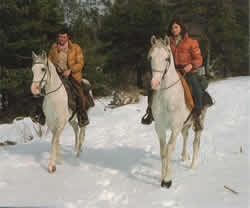
Jean-Claude
Cazade and Pascale Franconie return to France in the Winter
of 1984. |
Equestrian travel is not a modern trend restricted to people with
a ‘horsey’ background. In 1925, Swiss school teacher and
inexperienced horseman, Aime Tschiffely, bought two middle-aged, unbroken
wild horses from a Patagonian Indian in South America. People thought
him a lunatic doomed to failure, until he rode them 16,000km from
Buenos Aires, Argentina, to Washington D.C. In an incredible adventure
lasting two and a half years, Aime battled hostile natives, bureaucrats,
landslides, rope bridges and vampire bats. He survived, and fell in
love with his Criollo horses (wild descendants of horses imported
from Spain 450 years ago).
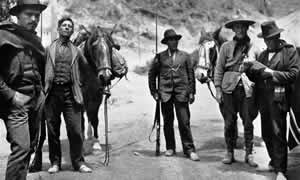
Border
formalities for Aimé Tschiffely, crossing
from Ecuador into Columbia. Aimé is holding his mount,
'Mancha', a border guard is holding 'Gato', the packhorse. |
Whether
inspired by the likes of Tschiffely or their own desire for
adventure, people have undertaken equestrian journeys on every
continent including Antarctica, where ninenteen Russian/Siberian
ponies undertook a sled journey. Sadly, none of these ponies
survived the expedition as they became trapped on an ice floe
and were eaten by killer whales.
|
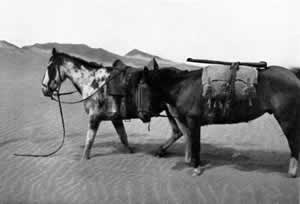
Aimé Tschiffely's horses 'Mancha' and 'Gato' crossing the
Peruvian desert.
SADDLE PILGRIMS
In 1994, a small band of equestrian travellers from many different
countries and walks of life, discovered they had much in common. Their
adventure may have begun as a ‘horseback holiday’, but somewhere
along the way, the destination lost its importance and the journey
itself became a sacred, life-changing experience. They had become
‘saddle pilgrims’ and forged a primeval bond of dependance
and love with their horses.
They formed ‘The Long Riders’ Guild’, an international
organisation with only one qualification for membership; a continuous
ride of at least 1,000 miles (1,600 km).
Several Australians have become members, including Steve Nott, who
rode 18,000km around our continent. The Guild has recently assisted
Jacqui Knight, who rode the length of New Zealand, in publishing a
book about her epic ride.
The
oldest member is George Patterson (now 81), who rode across Tibet
in 1946 and rescued the Dalai Lama from invading forces. The youngest
riders were Bud and Temple Abernathy, who rode from Oklahoma to New
York in 1910, then right across America from New York to San Francisco
in 1911. They were only 9 and 5 years old when they began the first
of their unchaperoned journeys!
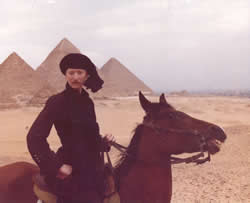
CuChullaine
O'Reilly at the Pyramids near Giza. |
One
of the club’s founders is American, CuChullaine O’Reilly,
who set the record for the longest recorded horse ride in
Pakistan’s history when he led the Karakoram Equestrian
Expedition through five mountain ranges, including the Himalayas.
For 20 years, CuChullaine has been collecting books and newsclippings
on equestrian journeys and collated these into an ‘Equestrian
Travel Timeline’.
|
This fascinating ‘who’s who’ of saddle pilgrims can
be seen on the website www.thelongridersguild.com,
together with entertaining travel stories from Long Riders around
the globe. The Guild aims to use its collective knowledge to assist
future equestrian explorers, inspire others to experience the freedom
of horse travel and give a ‘safe’ armchair view to those
who are unable or unwilling to ‘go there’. The website has
links to travellers who are currently ‘out there’ and updating
their sites with photos and reports.
|
THE
MOST DIFFICULT RIDE
“A man’s dying words should never be ‘I wish
I had...’”
Dragging himself through the sodden, raindrenched Yukon scrub,
Gene Glasscock felt like chewing up those words and heaving
them out with the next nauseous wave of bile that scorched
his throat. He’d left Alaska on horseback in summer to
avoid the treacherous icy winter, only to get caught n torrential
summer rain. His soggy boots fell apart and the heavy scrub
tore his ankles to pieces. Once blood poisoning set in, his
legs and feet swelled so that he could neither ride nor walk.
His dream of riding from the Arctic Circle to the Equator
had ended in a nightmare from which he barely escaped with
his life.
|
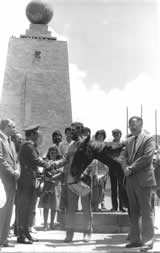
Gene
Glasscock and 'Cactus' are greeted by U.S. and Ecuadorian
officials at the Equator monument. |
Nearly
30 years later, mounted on ‘Cactus’ and leading his
packhorse ‘Freddy’, Gene, at 49, was back for a second
attempt, determined to ride 19,000 km to Quito, Equidor. Yet again,
danger and difficulty were his companions. In Mexico, a drunken
robber whacked him across the back with the blunt edge of a machete.
Gene wrested it off him efore his accomplice could join in the
fight, and the pair fled, leaving Gene bruised and shaken.
One of the high points was the kindness of the Mexican poor, who
offered him food and shelter when they lacked enough for themselves.
In Guatemala, Gene reached the depths of despair when a well-meaning
native fed his horses spoiled fodder. ‘Cactus’ survived,
but ‘Freddy’ died a slow and agonising death. Leaving
most of his possessions behind, he crammed what he could into
‘Cactus’s’ saddlebags and headed south; right into
the war raging in Nicaragua, where he witnessed executions and
was jailed by the Sandinistas on suspicion of being a Contra guerrilla.
The most difficult part of the journey was the infamous Darien
Gap where Central America joins South America. Gene hired an Indian
to guide him through the 400 km stretch of almost inpenetrable,
roadless, jungle. Using machetes to clear a trail, it sometimes
took hours to cover a few hundred metres. Reaching the river at
the end of the jungle, Gene found an Indian to take him across
in a dugout canoe. ‘Cactus’ jumped into the water and
swam alongside.
They reached the equator on the 29th April, 1986. ‘Cactus’
was given to the President of Equidor and joined a special mounted
security division of the Presidential guard.
Gene’s final thoughts? “I wouldn’t do it again
for a million dollars, but I wouldn’t take a million instead
of the trip!”
THE MOST EXOTIC RIDE
Pascale Franconie’s face was white with terror as the leering
Syrian bandits holding the gun against Jean-Claude Cazade’s
chest, demanded he hand her over along with their money. The pair
had ridden their Arab stallions from France, but it looked as
though they
would never reach their destination; Saudi Arabia. After the sublime
beauty of Italy, Greece, Yugoslavia and Turkey, their fate was
about to be sealed in the dismal wastelands of Syria.
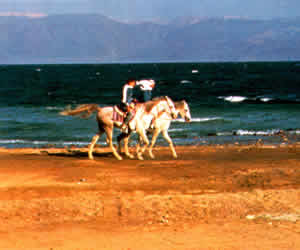
Pascale Franconie and Jean-Claude Cazade riding their
Arab stallions along the shores of the Red Sea. |
Without
warning, Jean-Claude’s stallion reared and plunged towards
the bandits. Startled, they jumped back and lowered their rifles,
giving the couple precious seconds to escape at a gallop. Their
journey fell back into its comforting routine; riding, riding,
riding...minarets on the horizon materialising out of a mirage...intricately
patterned carpets...men with long moustaches, fingering small
beads of stone or wood...buying or begging grain for their horses,
‘Mzwina’ and ‘Merindian’.
In the wilds of Anatolia, there were flocks of sheep, cloaked
shepherds and huge white sheep dogs wearing spiked iron collars
to protect the sheep from wolves. One week, Pascale and Jean-Claude
sipped tea with a Jordanian princess in palatial splendour; the
next week they sheltered from freezing night time temperatures
and raging sandstorms in a black Bedouin tent. They met Bedouin
nomads who welcomed strangers appearing out of the dark, shared
their meagre stew of cold beans in colder mutton fat and critically
assessed their stallions; height, width of tail, circumference
of cannon and to which families did they belong? The next day
they brought mares to them.
Red mountains barred the distant horizon and they felt like two
fragile specks riding through the vast Arabian landscape. Clad
in Arab headdresses, they crossed rippling
sandy deserts, long plains of black gravel and endless sand dunes
over ancient trails in the blinding heat...then fell into the
lap of luxury in some cool oasis village, dining
with a bearded prince...sitting on the ground and sharing a meal
of lamb eaten with the fingers.
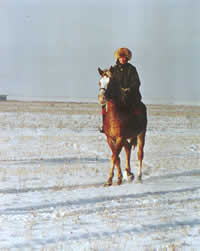
Britishwoman Basha O'Reilly riding Volga Cossack stallion
'Count Pompeii' across the Russian steppes. She rode from
Volgograd, Russia to England in 1995. |
After an audience with the Pope on their return journey to France,
‘Mzwina’ fell on Pascale, breaking her collar-bone and
Jean- Claude nearly died when ‘Merindian’ kicked him,
tearing open his femoral artery. They reached home in April 1984,
having ridden 20,000 km in 2 years, delighted to finish with their
horses fit, bright-eyed and ready to keep travelling...but saddened
that their exotic journey was finally over.
What motivates people to sell up their assets, make professional
and emotional sacrifices and dump comfort and security for the hunger
and hardship that haunt every equestrian pilgrimmage? Perhaps Laura
Bougault sums it up best.
“At last, the real world is coming toward me! After a great
effort I have managed to escape from the meaningless daily existence
that makes up so much of our life in the Western world...I long
to begin both my journeys, the one across this great continent (Africa),
the other, interior journey...to discover a new place inside myself.”
This
article was originally featured in the Australian magazine Hoofbeats
(December/January 2002) www.hoofbeats.com.au
 |
About
The Author....
Sharon Muir Watson
Sharon is well qualified to write on the subject of long rides
as, with her husband Ken Roberts, she was the first to ride
the Bicentennial National Trail, from Cooktown Qld, to
Healesville, Vic in 1991. Their plant of 12 rogue packhorses
slid, scrambled, bucked and swam over 5,000 km along the Great
Dividing Range. Sharon wrote a book called “The Colour
of Courage” about this two year adventure.
A regular contributor to Hoofbeats, Sharon and Ken now live
and work on a cattle and horse property near Thangool, in
Queensland.
|
.
|
|







